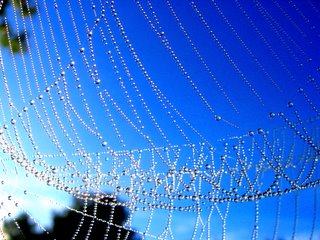 Here is something of a confession: What I found most troubling (by far) about the events of 9/11 was not the loss of life but the collapse of the Twin Trade Towers. That those pillars of steel and concrete could simply disappear within seconds unsettled me terribly. Karl Marx said of society under capitalism that "all things solid melt into thin air." But long before Marx, the book of Ecclesiastes tells us that all things that come from our hands are but "labored for the winds" and that there will be no "remembrance of things that are to come by those who will come after." Some day in the distance, even the stars and sun will shine no more. To think that the magnificent stone buildings in this photo will suffer the same fate as the diaphanous mushrooms in the foreground is indeed a reminder that if we do seek immortality, we best not seek it through our own labours.
Here is something of a confession: What I found most troubling (by far) about the events of 9/11 was not the loss of life but the collapse of the Twin Trade Towers. That those pillars of steel and concrete could simply disappear within seconds unsettled me terribly. Karl Marx said of society under capitalism that "all things solid melt into thin air." But long before Marx, the book of Ecclesiastes tells us that all things that come from our hands are but "labored for the winds" and that there will be no "remembrance of things that are to come by those who will come after." Some day in the distance, even the stars and sun will shine no more. To think that the magnificent stone buildings in this photo will suffer the same fate as the diaphanous mushrooms in the foreground is indeed a reminder that if we do seek immortality, we best not seek it through our own labours.
Tuesday, November 29, 2005
Wednesday, November 23, 2005
Monday, November 14, 2005
Subscribe to:
Comments (Atom)
 Hell is not mentioned at all in the Old Testament. As I understand Genesis 3, the punishments for our original transgression, some stated, some implied, are these: (1) Shame; (2) Death (along with disease and pain); (3) pain in childbirth; (4) Inequity between the sexes in marriage; (5) Toil instead of rewarding work; (6) and a fallen nature that produces "thorns and thistles". I confess that these punishments strike me as terribly thorough and sufficient. (I smile when I recall that my Reformed tradition informs us that we ought to be grateful for the mercy God demonstrated on that same day.) So why the need for Hell, that is, everlasting pain and anguish on top of these originally-stated punishments? Virtually no person in the New Testament writes or speaks of Hell at any length save one: Jesus. That our Lord speaks so frequently of Hell is reason enough for me to believe in it, but everything else in Scripture prompts me to believe that we can trust that Hell's role is for justice and not cruelty, and the language Jesus employed to describe Hell was designed for us to take it seriously, not because it is a literal description of the "place."
Hell is not mentioned at all in the Old Testament. As I understand Genesis 3, the punishments for our original transgression, some stated, some implied, are these: (1) Shame; (2) Death (along with disease and pain); (3) pain in childbirth; (4) Inequity between the sexes in marriage; (5) Toil instead of rewarding work; (6) and a fallen nature that produces "thorns and thistles". I confess that these punishments strike me as terribly thorough and sufficient. (I smile when I recall that my Reformed tradition informs us that we ought to be grateful for the mercy God demonstrated on that same day.) So why the need for Hell, that is, everlasting pain and anguish on top of these originally-stated punishments? Virtually no person in the New Testament writes or speaks of Hell at any length save one: Jesus. That our Lord speaks so frequently of Hell is reason enough for me to believe in it, but everything else in Scripture prompts me to believe that we can trust that Hell's role is for justice and not cruelty, and the language Jesus employed to describe Hell was designed for us to take it seriously, not because it is a literal description of the "place." Ancient Greek philosophers believed that the world has value even without a personal God intervening in human affairs. Christians believe that life and the world more generally receives its value from behind, lit, as it were, by a great sun. The Greeks believed, by comparison, that the world is self-illuminating. This is one reason Christians see atheism in such stark, almost hysterical terms: They find it hard to believe that life has any meaning at all without the Divine backlighting. In this sense, Nietzsche, Sartre, and other existentialists are in spirit more Christian than Greek; they buy into the Christian premise that life without a God is nihilistic. The Greeks seemed to have believed that seventy years of life is worth, at least, something. C.S. Lewis would agree with the Greeks but point to our yearnings for eternity to show how, finally, the Greek perspective cannot ultimately satisfy us.
Ancient Greek philosophers believed that the world has value even without a personal God intervening in human affairs. Christians believe that life and the world more generally receives its value from behind, lit, as it were, by a great sun. The Greeks believed, by comparison, that the world is self-illuminating. This is one reason Christians see atheism in such stark, almost hysterical terms: They find it hard to believe that life has any meaning at all without the Divine backlighting. In this sense, Nietzsche, Sartre, and other existentialists are in spirit more Christian than Greek; they buy into the Christian premise that life without a God is nihilistic. The Greeks seemed to have believed that seventy years of life is worth, at least, something. C.S. Lewis would agree with the Greeks but point to our yearnings for eternity to show how, finally, the Greek perspective cannot ultimately satisfy us. The monsters of other cultures--say, African or Asian monsters--always strike me as at least as comical as they are terrifying. One possibility is we have to be trained into fear, and I have not received the proper training to appreciate the horrors of Asian and African monsters. Another possibility is that what we fear, deep down, is the liminal, that is, that which has one foot in our world—the world in which we live and delude ourselves that we have mastered--and one foot in another world, a world altogether unknown and alien. That which is perfectly alien from our own experience is, well, neutral toward us. It is that which shares something with us that frightens us most: mutants; deformities; a corpse; vampires; speaking beasts, etc. Since African or Asian monsters emerge from a culture whose symbols do not gain traction with us, naturally their monsters seem simply "other" and therefore lack the immediacy necessary for terror.
The monsters of other cultures--say, African or Asian monsters--always strike me as at least as comical as they are terrifying. One possibility is we have to be trained into fear, and I have not received the proper training to appreciate the horrors of Asian and African monsters. Another possibility is that what we fear, deep down, is the liminal, that is, that which has one foot in our world—the world in which we live and delude ourselves that we have mastered--and one foot in another world, a world altogether unknown and alien. That which is perfectly alien from our own experience is, well, neutral toward us. It is that which shares something with us that frightens us most: mutants; deformities; a corpse; vampires; speaking beasts, etc. Since African or Asian monsters emerge from a culture whose symbols do not gain traction with us, naturally their monsters seem simply "other" and therefore lack the immediacy necessary for terror. How much of what we find beautiful had its origin in simple functionality?
How much of what we find beautiful had its origin in simple functionality? Probably quite a bit.
Probably quite a bit. One of the chief differences between European movies and American movies is that European movies end realistically--which is to say, sadly. What could be more real than the notion that all of us are born but for the grave? When I shared this "insight" with my students, their reaction was laughter. I could not decide whether their laughter was pure nervousness at the inevitability of their own mortality, or whether it was the laughter of wisdom--a reflection that the grave, in fact, does not define us. It may well be that America's ride-off-into-the-sunset mentality may--just may--reflect our deepest reality more accurately than the Europeans' pessimism.
One of the chief differences between European movies and American movies is that European movies end realistically--which is to say, sadly. What could be more real than the notion that all of us are born but for the grave? When I shared this "insight" with my students, their reaction was laughter. I could not decide whether their laughter was pure nervousness at the inevitability of their own mortality, or whether it was the laughter of wisdom--a reflection that the grave, in fact, does not define us. It may well be that America's ride-off-into-the-sunset mentality may--just may--reflect our deepest reality more accurately than the Europeans' pessimism.







.jpg)



